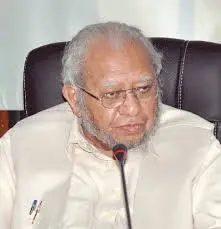Co-founder of Islamic Foundation and pioneer of Islamic economics, Prof Ahmad leaves behind a legacy of scholarship, activism, and public service
London: Professor Khurshid Ahmad, a distinguished Islamic economist, philosopher, politician, and former deputy chief of Jamaat-e-Islami (JI), passed away on Sunday in Leicester, United Kingdom, reports MNTV. He was 93.
Born on 23 March 1932 in Delhi, British India, Professor Ahmad grew up during a time of profound political change. After the partition of India in 1947, his family migrated to Pakistan and settled down in Lahore. He pursued his early education at Government College University, Lahore, securing a BA with first-class honours in Economics in 1952.
His academic journey continued at the University of Karachi, where he earned master’s degrees in Economics and Islamic Studies. Deeply influenced by the teachings of Abul A’la Maududi, he became an active member of Islami Jamiat Talaba in 1949, eventually aligning himself with Jamaat-e-Islami’s mission of Islamic revival.
In 1965, Professor Ahmad moved to the United Kingdom to pursue his PhD in Economics at the University of Leicester. His groundbreaking doctoral research focused on Islamic economic jurisprudence, a field he helped establish as a recognised academic discipline.
His contributions to education were acknowledged when Leicester University awarded him an honorary doctorate in Education in 1970.
A committed advocate for Islamic scholarship, Professor Ahmad co-founded The Islamic Foundation in Leicester along with Khurram Murad. The Foundation became a key institution for research and education in Islamic thought in the West.
Returning to Pakistan, Professor Ahmad played a pivotal role in the country’s Islamisation efforts. As chairman of the Planning Commission, he worked to integrate Islamic principles into Pakistan’s economic and policy frameworks.
His political career spanned several decades. In 2002, he was elected to the Senate of Pakistan on the Muttahida Majlis-e-Amal (MMA) platform, where he served until 2012. Throughout his political life, he remained a respected voice for Islamic values, socio-economic justice, and education reform.
Professor Ahmad’s work was recognised internationally. In 1990, he received the prestigious King Faisal International Prize for Service to Islam. In 2011, Pakistan honoured him with its highest civilian award, the Nishan-e-Imtiaz, acknowledging his immense contributions to Islamic scholarship, public service, and economic thought.
An accomplished author, lecturer, and policy adviser, Professor Ahmad’s influence extended across the Muslim world. His writings and initiatives helped shape modern Islamic economic theory and inspired countless students, academics, and activists globally.
Despite his public stature, Professor Ahmad remained deeply committed to education and intellectual engagement until his last days. He continued to mentor young scholars and contribute to debates on Islamic economics, philosophy, and governance.
He is survived by his family, students, colleagues, and a global community of admirers. His passing marks the end of an era, but his legacy of scholarship, activism, and dedication to Islamic values will continue to inspire future generations.
Funeral arrangements will be announced in due course. Prayers are being held across communities worldwide in his memory.




